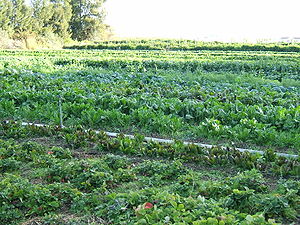Enviroment
|
| Enviroment
- Farm, Food, Organic and Natural Products, Bio, Fertilizer
|
| Enviroment, Farms, Foods, Organic and Natural Products, Bio, Fertilizers
|
The environment and farms ![-]()
|
| The environmental from the pro-organic view, holds that conventional agriculture is rapidly depleting natural resources, particularly fossil fuels and fresh water, and seriously polluting soil, water and air. Cited are the large quantities of agricultural chemicals in use (synthetic pesticides and fertilizers), water wastage through high-volume irrigation, heavy use of petrochemicals for farm machinery and long-distance transport, high densities of various waste products from concentrated operations, and the list goes on. While there is no argument that conventional agriculture relies on an abundance of these resources and creates a high volume of waste, agribusiness supporters (which naturally includes the majority of conventional farmers) argue that the negative claims are exaggerated or inaccurate. The fact that the current food industry exists and has fed the world for several decades is the biggest pro-argument to date.
|
| Most large-scale organic operations that don't follow sustainable practices would require many of the same resources as conventional operations. For example, an organic farm that made heavy use of farm machinery and indoor production facilities (requiring artificial heat and light), and shipped to far-off markets, would still be a major consumer of energy resources. Also, it is debated whether an organic farm using natural compost and manure on a large scale would cause any less damage to ground water and soil than manufactured fertilizers.
|
| Interestingly, many organic farms rely on inorganic manure to continue fertilization due to the large requirement for manure and relative unavailability of organic manure. This technically does not violate the traditional definitions of organic produce because there are no inorganic components added to the manure, although they may be present in its composition. Studies of the effects of chemicals within manure on organic produce is limited, although studies have shown that many carcinogens are present in variable amounts in even organic foodstuffs.
|
| An organically farmed hectare of land can feed approximately 10 people on an entirely vegetarian diet, they are not eating the cows, while a hectare of agrochemical enhanced land can feed up to 40.
|
| The 40 people would be better served by farming one hectare intensely with chemicals while the other 3 are reserved for woodlands and wildlife. Also emphasizes the affordability of the machinery necessary to produce the nitrogen rich chemicals that aid in conventional farming, stating that even low-income countries can afford Haber-Bosch factories, and these should begin to turn around food production there, just as they did in high-income economies. Endorses organic farming only as a method of reclaiming nitrogen from animal leavings that would otherwise be wasted. According to Dr. John Emsley, the former Science Writer in Residence at the University of Cambridge.
|
| A conventional farm can match an organic farm using only 50-70% of the farmland. Because of this land is left over which is used for willow plantations, this woodland serves as a home for a wealth of wildlife. The willow is later cut and tended, or coppiced, to encourage the growth of many branches which are then used for fuel. Trewavas concludes that with this novel conventional approach, now in commercial operation throughout Europe, total fossil-fuel use and carbon dioxide production are much lower than in organic farming, and because of carbon recycling it is much more sustainable. According Anthony Trewavas of the Institute of Cell and Molecular Biology at the University of Edinburgh
|
| Farm Methods Organic and Conventional
|
| Certified
|
| Transgenic
|
| Farm History
|
| Farms
|
